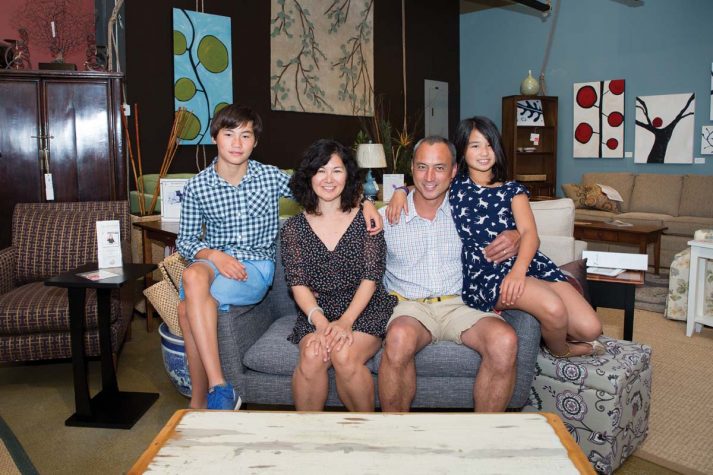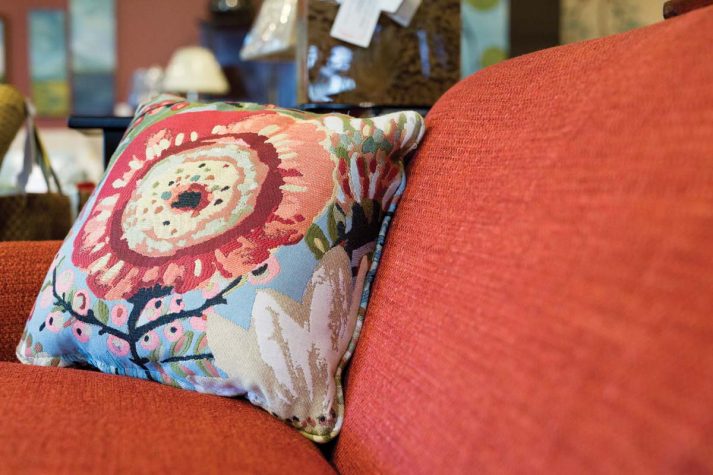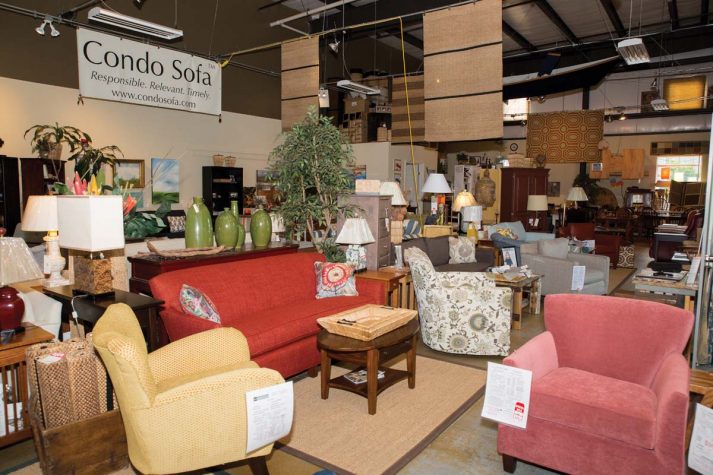Small Wonders
Endicott Home Furnishings lets you live large—and green—in tight spaces.
One of the first things you notice upon entering Endicott Home Furnishings is the lack of any new-furniture smell. But the omission of this olfactory offense—due to the Scarborough shop’s commitment to selling nontoxic furniture— isn’t all that’s immediately striking. There are also the classic, streamlined designs— from coffee tables to consoles, sleeper sofas to sectionals—created by owners and managers Ross and Christine Endicott. The husband and wife’s 17-piece base line is free of formaldehyde and chemical flame retardants, made in the United States, and sized for smaller spaces. It’s also completely customizable, with dozens of options for finishes and fabrics. “This is where you come in and figure out what you need,” says Ross, gesturing around the high-ceilinged space arranged with various furniture vignettes. “If it doesn’t exist, that’s not a big deal—we’ll make it.”
The couple opened the shop over a decade ago, having left corporate gigs in New York to be closer to Ross’s octogenarian father and to raise their family. (Their 8-year- old daughter, Maia, has the honorary title of “marketing director” and counts fabric selection as one of her favorite activities; 12-year-old Beo occasionally accompanies his father on furniture deliveries or helps with assembly.) “The nontoxic part of the business came organically because we have kids. We didn’t want to have this stuff in our furniture,” says Christine. “And we knew about smaller scale living from New York, so we wanted to have that type of furniture too.”
After some trial and error, they began mostly collaborating with a single vendor who shares their commitment to quality, quick turnarounds (standard upholstered pieces are delivered in four to six weeks), and customer service. When an issue arises—say, a customer ordered two different sofas and wound up preferring one style of cushion over the other—the Endicotts generally will not charge extra for replacement parts or shipping. This client-centered mentality has paid off. “Many of our customers come back to purchase more furniture from us,” says Christine. “Now we have a lot of baby boomer customers who are downsizing, and then of course there are the younger folks who are moving into condos downtown.”
It’s these clients who drive the couple’s designs. “Our pieces are not really ours,” says Ross. “They’ve evolved from asking our customers, ‘What do you need?’” The result is a furniture collection that’s ideally suited to Maine homes. There’s the Miles, a slimmed-down queen sleeper sofa with removable legs that fits easily through narrow stairways in old farmhouses, and the Piper sofa, whose low back is sized to sit beneath a picture window without obstructing the view. The Endicotts also carry select pieces from American manufacturers, such as Penn Creek Furniture’s Eency Weency, a 30-inch-long dining table that expands to seat 12 for a large lobster dinner. Easily cleanable upholstery options include fabrics woven from recycled plastic bottles that are impervious to sandy kids in swimsuits, wet dogs, and wine spills. Customization allows the couple to work with customers who are aging or have physiological challenges, something the Endicotts have first-hand experience with after caring for Ross’s father. “If someone needs to be able to stand up out of a sofa or chair more easily, we have the ability to change the height, firmness, and depth of the seat, as well as the back and arm height,” says Ross.
Sprinkled throughout the showroom are a few midcentury-inspired designs (including a molded plastic rocker), as well as photography and encaustic works by Bath artist KDB (Karen Dominguez), and even some one-off, reclaimed pieces by a local furniture maker in Gardiner. Hanging high above it all is one item that’s not for sale: a polished, caramel-colored wooden boat that Ross built for going out on the water with his son in the Belgrade Lakes region. Designed for both sailing and rowing (allowing the duo to power their way to shore when the wind dies), it serves as a striking symbol of the Endicott ethos: well-crafted, custom pieces that are comfortable, multi-functional, and thoughtfully considered to accommodate—and adapt to—one’s lifestyle.
Tips for furnishing a healthy home:
- Choosing furniture with easily cleanable covers makes everyday living less stressful. Fabrics that are low in cotton or made from 100 percent recycled fibers tend to be durable and naturally resist stains and fading without the use of chemical repellents. Note: The same manufacturer may produce fabrics with and without chemical treatments; a reputable dealer should know the distinction.
- Make sure your furniture is ergonomic. Proper alignment means that you can sit with both feet flat on the floor, with your legs at a 90-degree angle. The height of a sofa or chair arm can also impede body movement or make reading or knitting awkward, so check that the furniture works for the types of activities you plan to enjoy.
- Invest in quality. If an inexpensive sofa needs to be replaced early due to fabric that doesn’t wear well, poor construction, or a chemical smell that gives you a headache, it’s not a great deal. Well-made furniture is a green choice because it can be repaired or recovered and is made to last a lifetime.
- For an eco-friendly route that’s less expensive than certified organic upholstered furniture, look for pieces made with nontoxic foam (any off-gassing or strong odor would be a clear sign a piece contains formaldehyde) and without chemical flame retardants, which should be clearly stated on the label.













